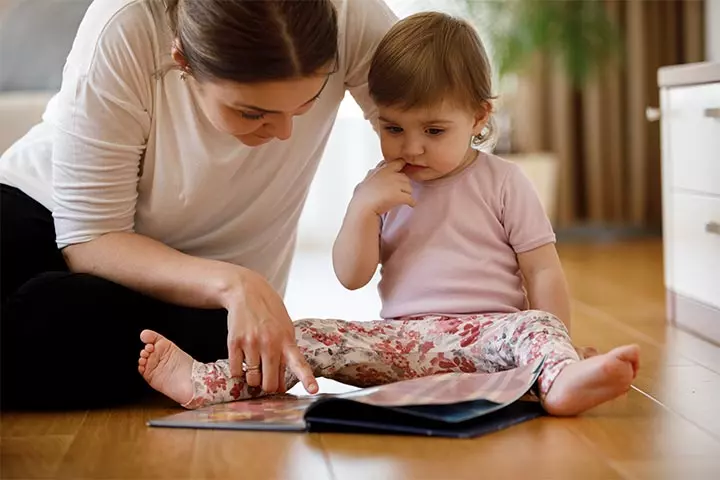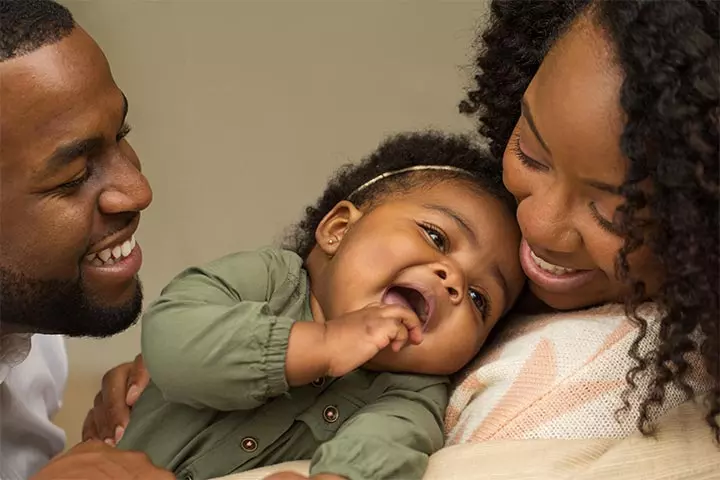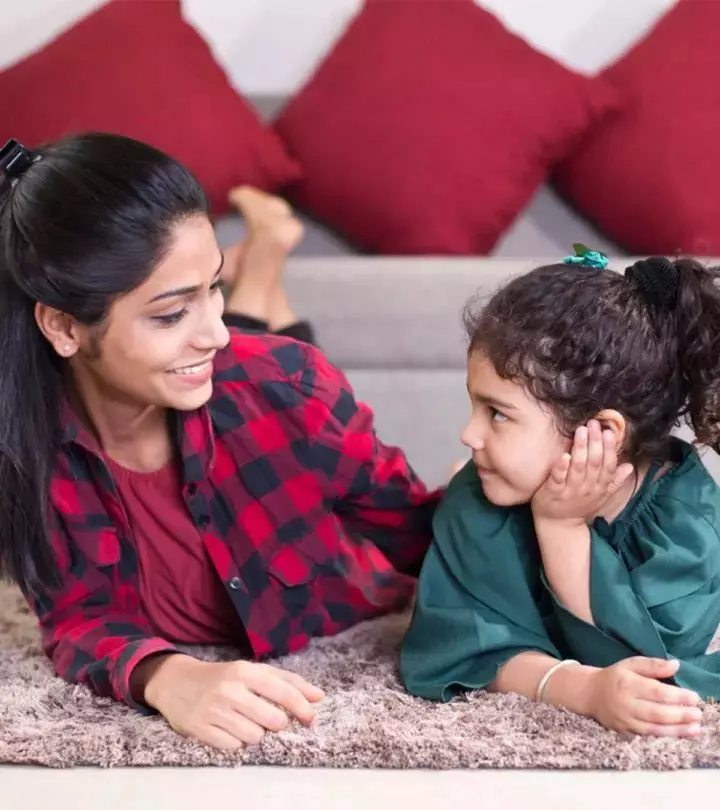
Image: Shutterstock
Children start picking up languages from a very early age. Though they don’t truly understand or can express themselves vocally, they do get familiarized with the sound of certain words. It is the home environment that strongly indicates a child’s ability to pick languages and express themselves. This can also predict later speech abilities as they slowly grow up (1). Hence, it is important that early caregivers, especially mothers, are truly present while the baby is nurtured and taught a new language.

If your baby hasn’t spoken yet, know that their first words will be music to your ears. It’s a thrilling experience you’ll cherish for the rest of your life! Your baby will eventually coo, babble, make short sounds, and even frame sentences going further. And all of this with your support, love, and care! Yes, science has proven that mothers can significantly impact a baby’s early language development (2). Curious? Read on to know more!
1. Do Babies Learn Languages In The Mother’s Womb?

Image: IStock
It has been observed that babies that are even a few weeks old, can distinguish between their native and foreign languages. Studies suggest that a baby’s language development begins while in the womb. At thirty weeks of pregnancy, sensory and brain mechanisms for hearing are developed. So, even before the baby is born, they can listen to their mother talk. A mother’s voice has the most significant influence on her unborn baby’s brain. Your baby even recognizes the vowel sounds in your voice! Therefore, it is true that the first speech sounds in the mother’s language are learned by the baby prenatally (3).
2. What Is A Mother’s Role In Influencing Language Skills In A Child?

Image: Shutterstock
Research has also found that a mother’s voice can play a critical role in developing speech. This happens because it can trigger specific parts of the brain responsible for language learning. Evidence derived from a study conducted by the University of Montreal suggests that a mother’s voice is unique to her baby (4). Babies can instantly differentiate between their mother’s voice from others.
Brain exploration of infants showed a significant reaction in the left hemisphere of the babies’ brain (which is responsible for language processing and motor skill development) when the mother uttered short vowel sounds. It has been confirmed that the mother is the primary initiator of language, and therefore, her involvement in the baby’s development of early communication skills is vital.
3. Speech Milestone For Babies

Image: IStock
It is important to note the speech milestones in your child’s language development so that you can track their progress and help them pick verbal and non-verbal cues to express themselves. Children will ideally speak their first words between nine to eighteen months of age (5).
The following guide is general and can differ from baby to baby. Know that every child is unique and will learn at their own pace. But here are some ways your baby will begin communicating with you in the first year:
- At the end of three months, your child will showcase prelinguistic behaviors like cooing, smiling, recognizing your voice, and crying to express a need.
- By the time your child is six months old, they can gurgle when left unattended, babble, move their eyes when they hear different sounds, recognize music or sounds made by toys, play their voice at different pitches, and copy some of your gestures.
- Your baby will start imitating sounds, laugh, play, or enjoy action games at twelve months of age. They can greet familiar faces by pointing or looking at them, say “mama” or “dada”, and follow simple instructions.
4. How Can You Help Your Baby Speak?

Image: IStock
The process of language learning happens even before your baby can speak words clearly and frame complete sentences. If you have been struggling to teach your baby how to communicate, know that it takes time. So, patience is key. Here are a few things you can do to encourage and help your baby speak:
- Be Present: This is the first step to making your child feel secure. Learning can only happen when they feel safe. It will also help you establish a bond with your child before you begin immersing them in language learning activities.
- No One-Size-Fits-All: Introduce your baby to a variety of activities and pick the one that makes them happy. If you observe noticeable differences in their ability to pick a word or two, your technique is working! Stay consistent, as this would take time.
- Speak To Your Baby Affectionately: When the baby coos, look out for their gestures. Without interrupting them, observe. If they look at you and stop, they may be looking for a response. Speak to them lovingly and let them hear the affection in your voice. This one-way conversation has to start in the early days to begin their attempts at vocalization.
- Experiment With Tones And Pitches: After about six to eight months, when they start combining vowels and consonants to make sounds like “mamma” and “dadda”, you can experiment with pitches. You’ll notice that they’ll also mimic your speech patterns.
- Coordinate With Your Baby: Put your baby on your lap, sing and read out to them using different tones and pitches. They need not understand the words right away, but they will be conditioned to learn as you slowly introduce them to the process. If they cry, it might be a sign that they need something more. Attend to their fussiness immediately with spoken words, and they’ll adapt
5. Language Development Concerns

Image: IStock
If your child’s language development skills are poor or they seem to have difficulty catching up, seek your doctor’s intervention. Also, let the doctor know if there are other areas in which your child appears to be lagging. More often than not, a delay in developing language skills may point to an underlying problem. If speech-related concerns are tackled early on, it could immensely benefit your child to seek extra help or medical intervention.
When your child is growing up in the first year, your doctor would also assess and evaluate them. There’s no race. They’ll eventually learn. For now, enjoy their cute naive sounds while they last! How did you help your baby with their language skills? Did you face challenges? Do share your stories with us in the comments section below!
References
- The role of home literacy practices in preschool children’s language and emergent literacy skills
https://pubmed.ncbi.nlm.nih.gov/15989397/ - Talking to children matters: Early language experience strengthens processing and builds vocabulary
https://www.ncbi.nlm.nih.gov/pmc/articles/PMC5510534/ - While in womb babies begin learning language from their mothers
https://www.washington.edu/news/2013/01/02/while-in-womb-babies-begin-learning-language-from-their-mothers/ - Mom’s voice plays special role in activating newborn’s brain
https://www.sciencedaily.com/releases/2010/12/101215195234.htm - Speech and language development (from 12 to 24 months)
https://www.gosh.nhs.uk/conditions-and-treatments/procedures-and-treatments/speech-and-language-development-12-24-months/
Community Experiences
Join the conversation and become a part of our nurturing community! Share your stories, experiences, and insights to connect with fellow parents.












